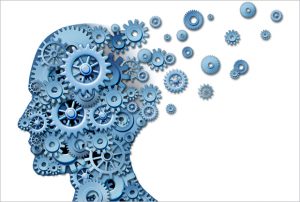Dementia is not a specific disease, but an overall term that describes a wide range of symptoms associated with a decline in memory or other thinking skills.
Contrary to popular belief, dementia is not a normal or natural part of aging, but a serious mental decline that affects only some persons as they age, and some can even suffer from early dementia.
While symptoms of dementia can vary greatly, at least two of the following core mental functions must be significantly impaired to be considered dementia:
- Memory
- Communication and language
- Ability to focus and pay attention
- Reasoning and judgment
- Visual perception
Many dementias are progressive, meaning symptoms start out slowly and gradually get worse. Professional evaluation may detect a treatable condition. Even if symptoms suggest dementia, early diagnosis allows a person to get the maximum benefit from available treatments to plan for the future.
Types & Causes of Dementia

Dementia is caused by damage to brain cells. This damage interferes with the ability of brain cells to communicate with each other. When brain cells cannot communicate normally, thinking, behaviour and feelings can be affected.
Alzheimer’s disease accounts for 60 to 80 percent of cases of dementia. Vascular dementia, which occurs after a stroke, is the second most common dementia type. There are also many other conditions that can cause symptoms of dementia, including some that are reversible, such as thyroid problems and vitamin deficiencies.
Different types of dementia are associated with particular types of brain cell damage in particular regions of the brain. For example, in Alzheimer’s disease, high levels of certain proteins inside and outside brain cells make it hard for brain cells to stay healthy and to communicate with each other. The brain region called the hippocampus is the centre of learning and memory in the brain, and the brain cells in this region are often the first to be damaged.
There is no one test to determine if someone has dementia. Doctors diagnose Alzheimer’s and other types of dementia based on a careful medical history, a physical examination, laboratory tests, and the characteristic changes in thinking, day-to-day function and behaviour associated with each type.
Treatment & Prevention
Treatment of dementia depends on its cause. In the case of most progressive dementias, including Alzheimer’s disease, there is no cure and no treatment that slows or stops its progression. But there are drug treatments that may temporarily improve symptoms. Non-drug therapies can also alleviate some symptoms of dementia.
Some risk factors for dementia, such as age and genetics, cannot be changed. But researchers continue to explore the impact of other risk factors on brain health and prevention of dementia. Some of the most active areas of research in risk reduction and prevention include cardiovascular factors, physical fitness, and diet.
Cardiovascular risk factors: Your brain is nourished by one of your body’s richest networks of blood vessels. You can help protect your brain with some of the same strategies that protect your heart – don’t smoke; take steps to keep your blood pressure, cholesterol and blood sugar within recommended limits; and maintain a healthy weight.
Physical exercise: Regular physical exercise may help lower the risk of some types of dementia. Evidence suggests exercise may directly benefit brain cells by increasing blood and oxygen flow to the brain.
Diet: What you eat may have its greatest impact on brain health through its effect on heart health. A recommended diet minimises the intake of red meat and emphasises whole grains, fruits and vegetables, fish and shellfish, and nuts, olive oil and other healthy fats.
Warning Signs of Alzheimer’s
1. Memory loss that disrupts daily life
One of the most common signs of Alzheimer’s, especially in the early stages, is forgetting recently learned information. Others include forgetting important dates or events; asking for the same information over and over; relying on memory aides (e.g. reminder notes or electronic devices) or family members for things they used to handle on their own.
2. Challenges in planning or solving problems
Some people may experience changes in their ability to develop and follow a plan or work with numbers. They may have trouble following a familiar recipe or keeping track of monthly bills. They may have difficulty concentrating and take much longer to do things than they did before.
3. Difficulty completing familiar tasks at home, at work or at leisure
People with Alzheimer’s often find it hard to complete daily tasks. Sometimes, people may have trouble driving to a familiar location, managing a budget at work or remembering the rules of a favourite game.
4. Confusion with time or place
People with Alzheimer’s can lose track of dates, seasons and the passage of time. They may have trouble understanding something if it is not happening immediately. Sometimes they may forget where they are or how they got there.
5. Trouble understanding visual images and spatial relationships
For some people, having vision problems is a sign of Alzheimer’s. They may have difficulty reading, judging distance and determining colour or contrast. In terms of perception, they may pass a mirror and think someone else is in the room. They may not recognise their own reflection.
6. New problems with words in speaking or writing
People with Alzheimer’s may have trouble following or joining a conversation. They may stop in the middle of a conversation and have no idea how to continue or they may repeat themselves. They may struggle with vocabulary, have problems finding the right word or call things by the wrong name.
7. Misplacing things and losing the ability to retrace steps
A person with Alzheimer’s disease may put things in unusual places. They may lose things and be unable to go back over their steps to find them again. Sometimes, they may accuse others of stealing.
8. Decreased or poor judgment
People with Alzheimer’s may experience changes in judgement or decision making. For example, they may use poor judgement when dealing with money, giving large amounts to telemarketers. They may pay less attention to grooming or keeping themselves clean.
9. Withdrawal from work or social activities
A person with Alzheimer’s may start to remove themselves from hobbies, social activities, work projects or sports. They may have trouble keeping up with a favourite sports team or remembering how to complete a favorite hobby. They may also avoid being social because of the changes they have experienced.
10. Changes in mood and personality
The mood and personalities of people with Alzheimer’s can change. They can become confused, suspicious, depressed, fearful or anxious. They may be easily upset at home, at work, with friends or in places where they are out of their comfort zone.
If you recognise these common signs in a loved one, visit a doctor as soon as possible to determine if he or she may have dementia.
Adapted for WellnessConnect from Source:
www.alz.org (1)
www.alz.org (2)

